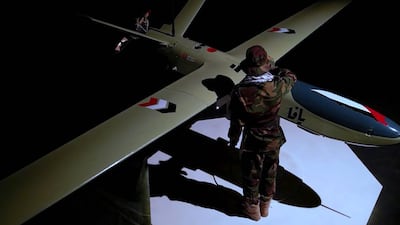Live updates: Follow the latest on Israel-Gaza
Yemen's Red Sea port of Hodeidah welcomed its first commercial ships since Saturday's Israeli strike that caused severe damage to its complex, as smoke from fuel tankers continued to billow, authorities of the vital entry point have announced.
A ship carrying 514 containers of various goods and another with about 20,000 tonnes of iron reached the port on Tuesday evening, Mohammed Al Sayes, the director of maritime operations at the Houthi-run port, said.
"The port of Hodeidah is functioning normally around the clock to receive all ships," he was quoted by local media as saying.
The port has been a lifeline for a country grappling with war, economic turmoil and one of the world's worst humanitarian crises. It has been crucial for the survival of millions of citizens, making it a focal point of humanitarian efforts and military conflict.
Israeli warplanes attacked a fuel depot at the Houthi-controlled port on Saturday, killing nine people and injuring at least 83. The air raid was in response to a drone attack on Tel Aviv that killed one and injured several others a day earlier.
The strikes on Hodeidah port, the first attack by Israel on Yemen, sparked a raging fire, with one resident telling The National that smoke continued to billow on Wednesday morning. The strikes put a nearby thermal power plant, producing about 20 megawatts of electricity, out of operation.
The Houthi strike on Israel was the farthest by the Yemeni rebels in the conflict. According to an Israeli assessment, the drone travelled 2,600km to its target.
In retaliation, Israel conducted one of its longest aerial missions, a 3,600km round trip, with an unknown amount of time spent over Yemen, a country impoverished and ravaged by a decade-long civil war.
A Yemeni source told The National that Hodeidah port “suffered significant damage, especially in the area of the port's cranes where five of them are operational and three are damaged”.
The source added that several of the port's warehouses were affected.

The Houthi movement, also known as Ansar Allah, comprises a heavily armed militia that controls Yemen's capital Sanaa and other regions in the north and west.
The rebels have bolstered their fighting capabilities since the civil war started in the country in 2014 and pose a serious threat to Yemen's neighbours and maritime shipping lanes.
Up until the end of 2018, the Houthis frequently used ballistic missiles they captured from army depots, supplemented by Iranian-smuggled weapons and domestic production, based on Iranian designs.
However, over the past five years, they have shifted to small, long-range, explosive drones that can evade radar detection.
As is the case with Hezbollah in Lebanon and other armed groups in Syria and Iraq, the Houthis are part of the Axis of Resistance, an anti-Israel political and military coalition in the Middle East led by Tehran.
Since the Gaza war began in October, the group has operated under a joint command that has mainly focused on choosing targets linked to Israel, as well as timing attacks, in support of Hamas.
The Houthi drone attack in Tel Aviv struck a diplomatic neighbourhood housing the US embassy.
While experts initially deemed it a “lucky” strike among many that failed to reach their targets, sources revealed on Monday that the attack was co-ordinated with regional allies.

